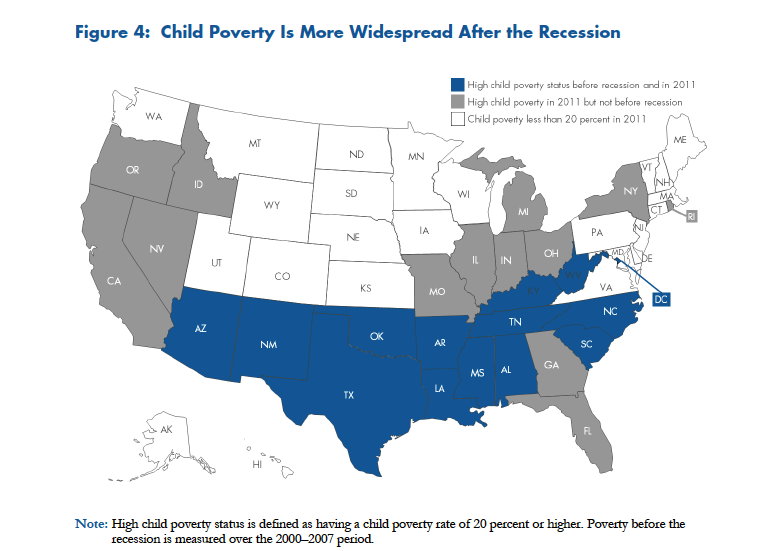The national unemployment rate has reached its lowest level in almost four years, according to the Bureau of Labor Statistics. With an unemployment rate of 7.8 percent, further progress is still needed to return to the level of 5 percent at the beginning of the recession.
The country, of course, is still in recovery despite the recession having officially ended. Since the start of the recession, according to census numbers, poverty levels climbed each year but leveled off at 15 percent in 2011. (Under the census’ poverty guidelines, a family of four would need to earn less than $23,000 to be considered living in poverty.)
Poverty in the U.S. disproportionately affects children. As of 2011, nearly one in four American children live in poverty. According to a study by Julia Isaacs and Olivia Healy of the Urban Institute, the rate of children living in poverty is expected to continue at its current rate for 2012.
Although final numbers for 2012 wont be available until September 2013, Healy and Isaacs use 2011 numbers and existing data from 2012 to predict final numbers for last year.
The study notes that while the percentage of children living with an unemployed parent has declined, the number families relying on Supplemental Nutrition Assistance Program (formerly known as food stamps) increased in the first part 2012.
Before the recession, the highest concentration of poverty was found mostly in the South and Southwestern United States. Since the recession high rates of poverty, especially among children, have become more dispersed, with California, New York and New Jersey added to the list of states with high levels of children living in poverty.
According to a report from the Foundation for Child Development, the economic decline of the American Family preceded the recession. The Foundation’s 2012 “Child Well-Being Index” indicates that the steady increase of children living in poverty began in 2001.
“Even though the economy is likely to recover in the next few years, a generation of disadvantaged children may not,” wrote Amy Novoteny in a September 2010 article for the American Psychological Association.
“Today’s poorer children could be haunted by the devastating effects of the recession for years to come,” wrote Novoteny, who pointed to research showing that children who live in poverty struggle more in school. She also found that children who grow up poor are also more susceptible to emotional and psychological stress and experience less parental interaction, a key part to childhood development.






_600_350_80_s_c1.jpg)









